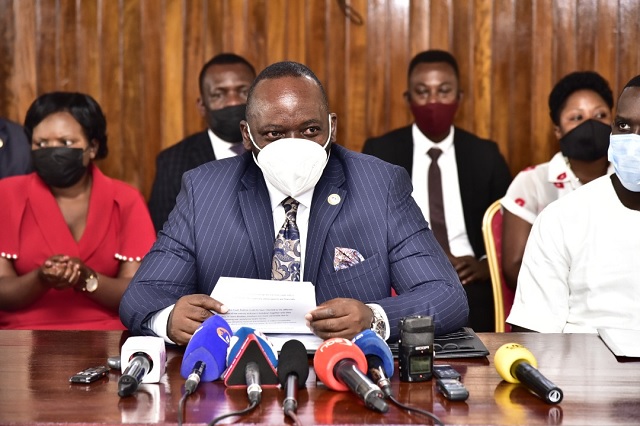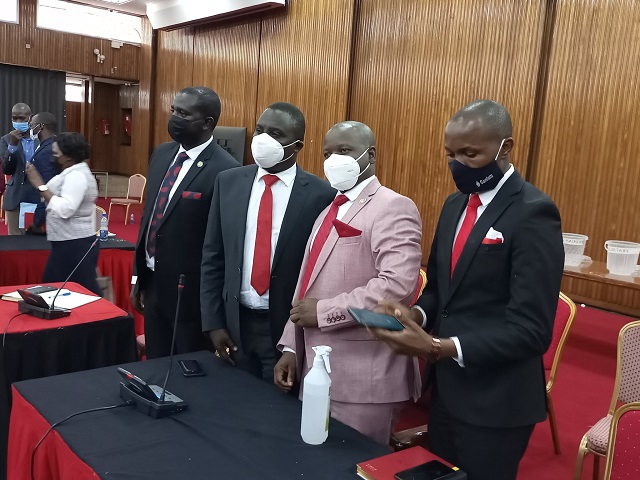By The Observer
KAMPALA-UGANDA.Prime Minister Robinah Nabbanja has announced a campaign aimed at countering the oversight tours conducted by Mathias Mpuuga, the Leader of Opposition in Parliament.
Mpuuga’s tours have exposed various issues of mismanagement within government institutions. Nabbanja’s move comes after her failed attempt to block Mpuuga’s tours across the country.
On June 14, Nabbanja visited Kawolo hospital in Buikwe district, shortly after Mpuuga had visited the facility. She issued a directive to resident district commissioners (RDCs) to prevent opposition lawmakers from accessing government hospitals.
However, Mpuuga, citing constitutional provisions, dismissed Nabbanja’s directive and emphasized her limits. Despite Nabbanja enlisting the support of Waiswa Mufumbiro, the deputy spokesman of the National Unity Platform (NUP), to dissuade opposition MPs from joining Mpuuga’s tours, the Leader of Opposition continued with his program.
He visited taxpayer-funded projects in several districts, including Mpigi, Butambala, Gomba, Mityana, Kassanda, and Kyotera. In response, on June 29, Nabbanja announced a countrywide tour called the “Farmer Education, Mobilisation, Value Addition, and Service Delivery Campaign.”
Former Tourism State Minister Godfrey Kiwanda was appointed to coordinate the campaign, which is set to begin on August 17 in Mityana district. During the campaign, Nabbanja, accompanied by NRM leaders and government technocrats, will travel to the five greater Mubende districts, namely Mityana, Kassanda, Mubende, Kiboga, and Kyankwanzi.
The aim is to provide farmers with guidance on improving productivity and offer them fertilizers at subsidized rates. Although the campaign is presented as an initiative to promote the Parish Development Model and Emyooga programs, insiders suggest that it is primarily intended to regain support for the NRM in Buganda region.
At the campaign’s launch, Nabbanja did not disclose the source of funding but stated that its purpose is to implement the agricultural sector’s recently issued policy guidelines by President Museveni. Nabbanja’s move comes after the government expressed discomfort with Mpuuga’s exposure of service delivery gaps.
Government officials have reached out to school and hospital heads, appealing not to provide Mpuuga with extensive information about the institutions under their charge.
In response to these attempts to limit his access to information, Mpuuga emphasized the critical role of members of parliament in legislation, appropriation, and oversight. He challenged government officials, such as State Minister for Primary Healthcare Margaret Muhanga, to visit health facilities across the country and ensure service delivery.
While some issues, such as the delivery of medicines by the National Medical Stores (NMS) and the provision of new hospital beds, were addressed promptly, other challenges, such as a lack of ambulance services and unreliable electricity at Kassanda Health Centre IV, proved more difficult to resolve.
SCHOOLS
“It is an insult to Muslims for the NRM to continue referring to Luweero as its Mecca,” said Mathias Mpuuga, referring to the poor conditions of Kiwoko Primary School in Nakaseke and Luweero Boys Primary School, where pupils were found sitting on the floor.
In Buvuma, Mpuuga discovered a school without classrooms and only one teacher on the government payroll. Reports suggest that since Mpuuga does not notify schools of his visits as he does with health facilities, resident district commissioners (RDCs) summon all head-teachers and instruct them on what to say.
However, the conditions of the schools make it difficult for headteachers to lie about the situation. For example, at Mityana Public School in Mityana municipality, classes are conducted under tents provided by Unicef and some purchased by parents.
“This is a clear indication of a failed government,” Mpuuga told a community meeting at Bekiina Primary School in Mityana on June 23. He also questioned the government’s reluctance to implement the policy requiring the establishment of a secondary school in every sub-county.
“It is a policy requirement that we have a primary school in every parish and a seed secondary school in every parish. It is shocking that everywhere we have visited, districts are reporting the absence of these public schools,” he stated.
Patrick Kintu Kisekulo, the Kyotera LC-V chairman, attributed the lapses in service delivery to the suffocation of the decentralization system by the government.
He explained that local governments no longer have a say in decision-making and project implementation. Kisekulo cited the example of seed schools, where only contractors are seen, resulting in numerous stalled projects across the country.
During a meeting at Kyotera district headquarters on June 29, Fred Zimula Kasirye, the Kassanda district chairman, informed Mpuuga that district chairpersons in Buganda had resolved to mobilize their colleagues nationwide to oppose the government’s recentralization of their roles.
He highlighted that Kassanda district loses Shs 1.5 billion in revenue every day from artisanal and small-scale miners, which could be used to improve infrastructure and hire staff. However, with centralized control, everything is managed from the center.
Mpuuga called for a new discussion on the decentralization system. He explained that his team in parliament has a different view on decentralization and intends to propose a devolution of powers once there is an opportunity to amend the constitution. Mpuuga emphasized that jurisdictions with successful devolution have clear revenue-sharing formulas between the center and local governments.
By The Observer
KAMPALA-UGANDA.Prime Minister Robinah Nabbanja has announced a campaign aimed at countering the oversight tours conducted by Mathias Mpuuga, the Leader of Opposition in Parliament.
Mpuuga’s tours have exposed various issues of mismanagement within government institutions. Nabbanja’s move comes after her failed attempt to block Mpuuga’s tours across the country.
On June 14, Nabbanja visited Kawolo hospital in Buikwe district, shortly after Mpuuga had visited the facility. She issued a directive to resident district commissioners (RDCs) to prevent opposition lawmakers from accessing government hospitals.
However, Mpuuga, citing constitutional provisions, dismissed Nabbanja’s directive and emphasized her limits. Despite Nabbanja enlisting the support of Waiswa Mufumbiro, the deputy spokesman of the National Unity Platform (NUP), to dissuade opposition MPs from joining Mpuuga’s tours, the Leader of Opposition continued with his program.
He visited taxpayer-funded projects in several districts, including Mpigi, Butambala, Gomba, Mityana, Kassanda, and Kyotera. In response, on June 29, Nabbanja announced a countrywide tour called the “Farmer Education, Mobilisation, Value Addition, and Service Delivery Campaign.”
Former Tourism State Minister Godfrey Kiwanda was appointed to coordinate the campaign, which is set to begin on August 17 in Mityana district. During the campaign, Nabbanja, accompanied by NRM leaders and government technocrats, will travel to the five greater Mubende districts, namely Mityana, Kassanda, Mubende, Kiboga, and Kyankwanzi.
The aim is to provide farmers with guidance on improving productivity and offer them fertilizers at subsidized rates. Although the campaign is presented as an initiative to promote the Parish Development Model and Emyooga programs, insiders suggest that it is primarily intended to regain support for the NRM in Buganda region.
At the campaign’s launch, Nabbanja did not disclose the source of funding but stated that its purpose is to implement the agricultural sector’s recently issued policy guidelines by President Museveni. Nabbanja’s move comes after the government expressed discomfort with Mpuuga’s exposure of service delivery gaps.
Government officials have reached out to school and hospital heads, appealing not to provide Mpuuga with extensive information about the institutions under their charge.
In response to these attempts to limit his access to information, Mpuuga emphasized the critical role of members of parliament in legislation, appropriation, and oversight. He challenged government officials, such as State Minister for Primary Healthcare Margaret Muhanga, to visit health facilities across the country and ensure service delivery.
While some issues, such as the delivery of medicines by the National Medical Stores (NMS) and the provision of new hospital beds, were addressed promptly, other challenges, such as a lack of ambulance services and unreliable electricity at Kassanda Health Centre IV, proved more difficult to resolve.
SCHOOLS
“It is an insult to Muslims for the NRM to continue referring to Luweero as its Mecca,” said Mathias Mpuuga, referring to the poor conditions of Kiwoko Primary School in Nakaseke and Luweero Boys Primary School, where pupils were found sitting on the floor.
In Buvuma, Mpuuga discovered a school without classrooms and only one teacher on the government payroll. Reports suggest that since Mpuuga does not notify schools of his visits as he does with health facilities, resident district commissioners (RDCs) summon all head-teachers and instruct them on what to say.
However, the conditions of the schools make it difficult for headteachers to lie about the situation. For example, at Mityana Public School in Mityana municipality, classes are conducted under tents provided by Unicef and some purchased by parents.
“This is a clear indication of a failed government,” Mpuuga told a community meeting at Bekiina Primary School in Mityana on June 23. He also questioned the government’s reluctance to implement the policy requiring the establishment of a secondary school in every sub-county.
“It is a policy requirement that we have a primary school in every parish and a seed secondary school in every parish. It is shocking that everywhere we have visited, districts are reporting the absence of these public schools,” he stated.
Patrick Kintu Kisekulo, the Kyotera LC-V chairman, attributed the lapses in service delivery to the suffocation of the decentralization system by the government.
He explained that local governments no longer have a say in decision-making and project implementation. Kisekulo cited the example of seed schools, where only contractors are seen, resulting in numerous stalled projects across the country.
During a meeting at Kyotera district headquarters on June 29, Fred Zimula Kasirye, the Kassanda district chairman, informed Mpuuga that district chairpersons in Buganda had resolved to mobilize their colleagues nationwide to oppose the government’s recentralization of their roles.
He highlighted that Kassanda district loses Shs 1.5 billion in revenue every day from artisanal and small-scale miners, which could be used to improve infrastructure and hire staff. However, with centralized control, everything is managed from the center.
Mpuuga called for a new discussion on the decentralization system. He explained that his team in parliament has a different view on decentralization and intends to propose a devolution of powers once there is an opportunity to amend the constitution. Mpuuga emphasized that jurisdictions with successful devolution have clear revenue-sharing formulas between the center and local governments.



